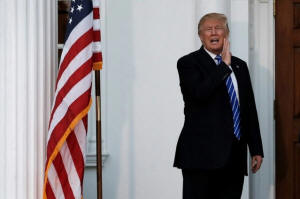|
U.S. companies hope Trump will stick to
business roots, back Cuba ties
 Send a link to a friend
Send a link to a friend
 [November 29, 2016]
By Patricia Zengerle and Mike Stone [November 29, 2016]
By Patricia Zengerle and Mike Stone
WASHINGTON (Reuters) - U.S. companies are
looking for ways to persuade President-elect Donald Trump to soften his
threats to cancel the Obama administration's opening to Cuba, a reversal
they fear could cost them hundreds of millions of dollars.
During his campaign, Trump said he thought restoring diplomatic ties
with Cuba was fine, but that Democratic President Barack Obama should
have pushed harder for concessions from Havana before easing
restrictions on travel and trade.
On Monday, three days after the death of revolutionary leader Fidel
Castro, the Republican president-elect said in a Twitter post that he
would end what he referred to as Obama's "deal" if Cuba did not do more
for its people.
But he did not promise to reverse the changes, and advocates for closer
ties said they hoped the businessman-turned-politician would stay true
to his roots and foster economic ties.
"He has said things that are frankly hopeful to folks on both sides of
the debate," U.S. Representative Mark Sanford, one of several Republican
lawmakers who back increased engagement, told Reuters.

Trade associations for companies with business interests in Cuba hope to
persuade Trump to continue Obama's opening, and have been discussing a
joint effort to press the Republican's administration, a person with
knowledge of the talks said.
Trump won the White House on promises to create jobs. Advocates for
increased engagement argue that promoting U.S. trade with Cuba would
create opportunities, and jobs, in industries from telecommunications to
agriculture, and particularly in tourism.
SMALLER PIECE OF CAKE
Several U.S. airlines are already flying to Cuba, Starwood Hotels &
Resorts signed a contract to manage a Cuban hotel and Carnival Corp has
begun cruises to the island.
While business in Cuba has yet to generate much revenue for U.S.
companies, reversing Obama's policies could leave Americans out of a
potential market or mean their investments so far have been wasted.
"If the U.S. continues to limit trade (with Cuba), and the European
Union, China and Russia continue to expand trade, there will be a
smaller piece of cake left for U.S. companies," said Jose Maria Vinales
Camallonga, director of International Operations at Lupicinio, a Spanish
law firm that represents large corporations in their Cuba dealings.
As Trump issued his tweet on Monday, American Airlines Flight 17, the
first commercial flight in more than half a century between the United
States and Havana took off for the Cuban capital, part of a wider push
by U.S. carriers to boost flights there.
[to top of second column] |

President-elect Donald Trump yells to members of the media from the
steps of the main clubhouse at Trump National Golf Club in
Bedminster, New Jersey, U.S., November 19, 2016. REUTERS/Mike Segar

If flights stopped or demand slipped because Trump imposed new
travel restrictions, U.S. airlines could lose hundreds of millions
of dollars in potential revenue in the years to come, said John
Kavulich, president of the U.S.-Cuba Trade and Economic Council.
The Department of Transportation has authorized 1.2 million seats
for trips to Cuba by commercial U.S. carriers per year, below the
3.4 million airlines requested, but representing significant
revenue, he said.
Cuba also represents a potential market for U.S. products such as
chickens, wheat and rice, though U.S. farm exports to the island
have actually fallen since Obama and Cuban President Raul Castro
moved to normalize relations in December 2014.
Still, lawmakers from several states with big agricultural sectors
like Arkansas and Texas back closer ties.
If Trump reversed Obama's Cuba policies "he would have to take on
one of his main constituencies, which is the business community,"
said Julia Sagebien, an expert on Cuban business at Dalhousie
University in Nova Scotia.
In a bid to cement Obama's Cuba policy before Trump takes over on
Jan. 20, the administration has been encouraging U.S. companies to
forge further business deals.
More than half a dozen announcements, in areas from travel to
manufacturing to telecommunications, had been expected in the next
two months, a person familiar with the matter said. But Fidel
Castro's death and uncertainty about Trump's plans could affect that
timeline, the person said.
(Additional reporting by Sarah Marsh in Havana, Matt Spetalnick and
Joel Schectman in Washington, Malathi Nayak in New York and Jeffrey
Dastin in Los Angeles)
[© 2016 Thomson Reuters. All rights
reserved.]
Copyright 2016 Reuters. All rights reserved. This material may not be published,
broadcast, rewritten or redistributed.

 |